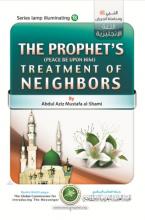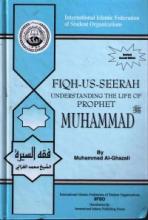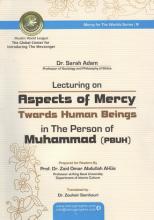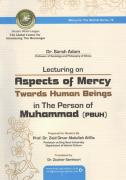The Prophet of Mercy Website
Muslim World League - Global Commission for Introducing the Messenger
The audience who were following these lectures kept arriving in the hall. Dr. Adam arrived before some of them. An observer of these lectures will notice that the Fourth Lecture is different from the previous one. Some of the audience were quite alert. They entered the hall and kept consulting their notes. There were also side discussions, most of which were not heard.Dr. Adam began her lecture by saying, “The first ten minutes, dear audience, are reserved for you to discuss the query brought up at the end of the previous lecture.”One of the audience, who was, presumably, in his sixties, stood up and said, “n my opinion, I think the answer to the query should be postponed, as it is not easy to clarify this point before becoming acquainted with the remainder of the life story of the Prophet of Mercy, pbuh, and pondering its events.I hope the others will not be prevented from expressing their opinion.” Then he thanked Dr. Adam, who, in turn, made no comment, but merely smiled and reciprocated the gesture and thanked him for his intervention.At this point, a woman, who seemed hesitant and looked around her to see if anyone desired to talk before her, but saw no one, said "The honorable speaker’s opinion is fine and is appreciated; however, it seems to me that we have come across some events that serve our cause and should not be ignored.
The path of forgiveness and mercy followed by the Prophet of Mercy, pbuh, was not his own choice but was ordered by God Almighty, as we have seen in the previous Qur’anic instructions. The Prophet has definitely complied with and adhered literally to them. This means this attribute was not an outcome of circumstances, potentials or opinion on the part of the Prophet, and the events that will follow after the conditions of the Prophet, pbuh, have changed will prove that.I hope I have been able to get my idea across, and I certainly do not possess Dr. Adam’s potentials and her ability of expression.” Dr. Adam thanked her and highly praised her proper view.Dr. Adam then said that there was time left for a third person to express his view; thereupon one stood up at the back of the hall and said aloud, “I am that person.” All the audience turned towards him and he said, “It seems to me that if the Prophet of Mercy, pbuh, had wanted to retaliate to the harmful deeds, he could have done that. You will remember that his followers asked him more than once to permit them to use force in self-defense, but he did not give them permission. He told them clearly and openly that he had not been given permission yet. So, it is not a question of weakness and incapacity. Thank you.”
Then Dr. Adam said, “I apologize; I did not mean to prevent anyone from expressing their view, when I limited the time to ten minutes. So I invite, again, anyone who wishes to express an opinion to do so.”A young person, who was known to Dr. Adam, because he was one of her students at the University, said enthusiastically, “What was it that prevented the followers of the Prophet of Mercy, pbuh, who used to be tortured during the day, to avenge themselves from their enemies during the night, for instance, and we know the nature of the place? It is definitely, in terms of its potentials, unlike any city known to us these days. Thank you.”Dr. Adam admired the enthusiasm of the speaker and his swift intervention and felt that he had attracted the attention of the audience. So she thanked him and said a few words of encouragement and then proceeded. “Dear audience, I am very pleased these moments. I cannot tell whether my pleasure derives from the opinions I have heard, which clearly indicate your assimilation of what I say, or whether it springs from your growing and increasing appreciation of these lectures, as I notice. This is because all of us look forward to seeing the sequence of events, to see if they confirm the statement that mercy is an innate attribute that characterizes the Prophet of Mercy, pbuh, one that does not alter or change, or whether they confirm the statement that mercy and tolerance were the result of weakness and incapacity.”
“Dear audience,
From the very start, the Prophet of Mercy, pbuh, has established the outline of what is known in modern terminology as a theory of the ethics of mercy, which is clear from his words and deeds. I propose to expound them by adducing the following manifestations:
1. Through constantly reminding his followers that God Almighty is Merciful and Compassionate, thorough the persistent reading of the Qur’an. Suffice it to say that a Muslim reiterates the phrase “Merciful, Compassionate” about thirty times daily in the compulsory and voluntary prayers, when reading Al-FatiHat (the opening surah) of the Qur’an in every cycle of his prayers. The reminiscence of God’s Mercy prompts a Muslim to seek to acquire such attribute.In a manifestation of God Almighty’s mercy to all his creatures, He has sent down a portion of His Mercy to the earth for those creatures. This was made clear by the Prophet, pbuh, when he said, “God has divided mercy into 100 parts. He kept for himself 99 parts and sent down to earth one part. It is this part that is reflected in the mutual mercy of creatures towards one another, as exemplified by the mare raising its hoof from its pony for fear it would hurt it.”[1] “Reference to a mare’s mercy towards its pony is a subtle sign of the mutual mercy among animals, and men are more needful of such mutual mercy, because they are more pernicious towards one another in the absence of mercy and its replacement with brutal force and hatred.”
“2. The Prophet of Mercy, pbuh, was keen on reminding his followers of the standing and importance of mercy and that it is not a complementary, aesthetic attribute, but is a necessary and crucial one. In another tradition on mercy, he said, “He who does not show mercy to human beings will not receive God’s Mercy”.[2] He also said, ‘Those who are merciful will receive God’s Mercy; Have mercy on those who are on earth, and He who is in Heaven will have mercy on you.’”[3]“It is worth noting, in this context, that the Prophet, pbuh, was keen on spreading mercy to the widest extent among people. He was not satisfied that his companions should show mercy merely to members of their family, relatives and close friends. Such mercy is commendable, but may be driven by other motives.Thus, in connection with this concept of mercy, he says to his companions, “You shall not attain faith until you attain mutual mercy among yourselves.” The companions said, “O, Messenger of God, all of us are merciful.” He said, “Mercy is not merely a sentiment that you show to your friend, but is for all people.”[4] This is a proper guidance that contributes to the propagation of mercy among people, and is shown to be a commendable attribute and a great human value. He used to judge his companions according to the degree of mercy they have assimilated in themselves and considered it a great merit in them. Thus he said once, “The most merciful towards my people is Abu Bakr.”[5] This is an indication of the value he attributed to it, by revealing to his companions his predilection of Abu Bakr.
3. The spontaneous, unpretentious practicing of Mercy by the Prophet, pbuh, in all matters of his life. Thus he once visited the grave of his mother, sat there and wept, while he was surrounded by his companions.[6] Once, he visited, together with some of his companions, one of his companions, Saad bin Ubadah, who was sick. When he saw his condition, he wept.[7] Indeed, the Prophet of Mercy, pbuh, was so sensitive that he would shun seeing certain situations, because his merciful soul could not bear them.A close companion of his, Osamah bin Zaid, has reported that, “Once we visited the Prophet, pbuh, and one of his daughters sent a messenger to tell him that her son was dying. He told the messenger to tell her that to God returns what He has given and everything for Him had an appointed time and to tell her also to be patient and to resign herself to God. The messenger returned to the Prophet and told him that she adjured him to go to her.” He went on to say, “the Prophet, pbuh, went to her, together with Saad bin Ubadah, and I went with them. The Prophet, pbuh, lifted the boy who was in the agony of death and wept. At that, Saad said, ‘What is this, O, Messenger of God?’ The Prophet said, “This is the mercy that God has implanted in the souls of his servants, and God is merciful towards His merciful servants.”[8]The questioning by this companion, which indicates some surprise, shows that the prevailing culture of those days deplored weeping by great men, as this would not become them in the eyes of their people. So the Prophet, pbuh, took the opportunity to correct such concepts.
The Prophet found it difficult to be present at such event, because he was too merciful to bear such happening to the child, and out of his mercy towards his mother. But when he did come and saw the agony of death experienced by the child, he wept, while some of his companions were looking at him. Thus, he took the opportunity to indicate to them that such happening necessarily provokes weeping, which is a sign of mercy. The Merciful God rewards His merciful servants by being merciful to them.When his son Ibrahim died, he wept. He also wept on many other occasions, while his companions were watching and wept with him, spontaneously and sincerely. It is a clear invitation by the Prophet, pbuh, to the indispensable positive interaction that is appropriate to the situations, and a warning against indifference, cruelty and stagnation.Allow me to mention in this context two testimonies by senior Arab chiefs, who were the bitter enemies of the Prophet, pbuh. They had given this testimony before they embraced Islam. These were Abu Sufyan bin Harb and Urwah bin Masoud al-Thaqafi.The former has said, “I have never seen any people loving any one like the love shown by the companions of Muhammad to Muhammad.”[9]Such love produces effects and fruits. The Prophet’s companions were extremely keen on following on his footsteps: everything he said or did. They were extremely eager to emulate him, in all his attributes, and I believe that the attribute of mercy was in the forefront thereof. “He warned his companions against rigid hearts and strongly admonished those who shun mercy, regardless of his position or status.
Once Al-Aqra’bin Habis, a leader of the tribe of Bani Tamim and a well-known personality at the time, came to the Prophet, pbuh, on some business. At that moment the Prophet, pbuh, was holding a child and kissing him. Al-Aqra’was surprised to see this and it seemed that he had expressed disapproval and said to the Prophet, “Do you kiss your children? I have ten children and I have never kissed any one of them.”The Prophet, pbuh, gave him a rebuking look and said, “He who is not merciful will not be shown any mercy. What can I do to you if God has lifted mercy from your heart!”[10]It seems that Al-Aqra’ was under the impression that kissing and entertaining children is not consistent with leadership and greatness. It was this that made him disapprove of the action of the Prophet, pbuh. He was perhaps particularly disapproving because the Prophet, pbuh, did that in his presence, as though the gathering of senior persons is no place for the kissing of a child.The Prophet, pbuh, wanted to teach Al-Aqra’a a lesson from which those present would benefit and those it would reach rapidly: Greatness lies in simplicity and is manifested in the practice of mercy.Following is another scene that reflects mercy in its most beautiful aspects. The Prophet, pbuh, used to line up his cousins, the sons of his uncle Al-Abbas: Abdullah, Obeidallah and Kathir, and ask them to race and to tell them: “He who arrives first I shall reward him with so and so.” So they race towards him and fall on his back and chest, and he would hug and kiss them.[11]You can imagine, dear audience, a man towards whom three children rush and attempt to beat each other at reaching him first and win the promised reward.. It is a scene that abounds in mercy, spontaneity and casualty.
This scene reminds me of how leaders attempt to endear themselves to their electorate on official occasions or in election seasons by showing affection to children and kissing them. They do this because they realize that such gestures draw a bright picture of them and endears them to the electorate.However, the Prophet of Mercy, pbuh, used to make such gestures in his words and deeds 1400 years ago, in sheer spontaneity and sincere intention.The Prophet, pbuh, has sought to implant the attribute of mercy in people because it is one of God’s beautiful attributes and not for any other motive. Among the methods he used in this respect was to urge people to practice mercy towards other creatures, so that mercy would be deeply rooted in them and spontaneously practiced in their dealing with one another.One of his close companions, Abdullah bin Masoud, has reported the following episode: “While in travel, the Prophet withdrew from us to answer the call of nature. During his absence, we saw a bird with two chicks, which we took. The mother approached us and spread its wings, as though requesting that we return her chicks to her. When the Prophet, pbuh, saw this, he said, “Who has agonized this bird by taking away its chicks? Give them back to it.Further in the way, he discovered that we had burnt a multitude of ants and asked who had done that. We said that we were the ones who had done that. So he said, “It is only the Lord of fire who torments in fire.”[12]
The Prophet, pbuh, told his companions two stories in this respect. One is reported by his companion Abu Hurairah, which goes: “A man was walking in a lonely place and felt thirsty. He found a well, went down it, drank his fill and when he went up, he saw a dog panting and searching in the sand for water with which to quench his thirst. So the man said to himself, ‘this dog is just as thirsty as I was. So he went down the well, filled his slipper with water and gave the dog to drink. God appreciated this deed and forgave him his sins.’ The companions said, ‘Shall we be rewarded for caring for animals?’ He said, ‘You will be rewarded for each animal you care for.’”[13] In a similar story, he warned against cruelty to animals. Thus he said, “A woman was tormented on account of a cat, which she locked up till it died. The woman was punished in Hell, for she neither gave it anything to eat or to drink, and locked it up, nor did he let her look for something to eat in the open.”[14] The Prophet, pbuh, has repeatedly made such points, narrated such stories and performed such practices because they are sure to penetrate deeply into people’s souls and prompt them to establish self-discipline in matters of nurturing such attribute of mercy, which attribute every one on earth needs. It was as though his first and foremost concern was to spread mercy and make sure it is put into practice, so that it would become a social trait and a social landmark that governs social relations and contributes to the solving or narrowing of problems.
Thus the Prophet, pbuh, was keen on firmly establishing, in the minds of his followers and those who appreciate virtues, the love and perpetuation of mercy at all times and in all cases, without strings attached to mundane or temporary motives, such as those sociologists talk about.This kind of education creates an inner feeling among the followers of the Prophet, pbuh; that mercy is its own reward and is, sooner or later, needed for its beneficial effects. Thus, a Muslim would treat any animal, such as a dog, mercifully, and if he has a cat he does not make it suffer but would be kind to it, and if he comes across a tiny little bird, he would have pity on it and handles it mercifully.The Prophet, pbuh, was always merciful towards the weak and unprivileged such as servants. He urged that they be not given too much work or too difficult work and not to be treated cruelly. Thus, his servant, Anas, has reported that the Prophet had never been harsh towards any servant. The Prophet, pbuh, has urged that this category of people be treated mercifully. In this respect, he said, “They are your brethren and have been entrusted to you. Give them to eat what you eat, and clothes such as you wear, and do not set harsh tasks to them and in such cases give them a hand.[15]
I see a merciful touch in the Prophet, pbuh, in his teaching, which is a matter that seems of minor importance, but which is highly significant. Thus Abu Hurairah reports that the Prophet, pbuh, said, “If a servant cooks some food for one of you and he brings it while it is still hot and steaming, then let him share the food with him, and if the amount of the food is not quite enough, then let him give his servant a little of such food.[16] I cannot help feeling, dear audience, that this is a superior instruction that implants mercy quietly and gracefully in people’s souls. Just imagine his urging people to sit with their servants and eat with them the food the servants have cooked, and if this is not possible, for some reason or another, the master of the house should give the servant some of this food, prompted by considerations of mercy and kindness towards the servant.Hearts that are sensitive and souls that are pure realize that mercy is a must, as a result of the statements they heard and the events they witnessed in which the Prophet, pbuh, was involved, and through their being ordered to follow on the footsteps of the Prophet and try to emulate him. Moreover, he was not content with the admiration shown by his followers or their surprise at his mercy in words and deeds, and his inviting them to adhere to mercy, while some of them remained unaffected by his teachings, as in the case of some previous great figures and reformers.
The Prophet, pbuh, was keen on seeing his followers practice mercy in words and deeds and urged them to assimilate it by various means. This prompts us to say that among the signs of the Prophet’s mercy towards people is his teaching of mercy to them and helping them to practice it and urging them to put it into practice in their daily affairs.This is exemplified by his statement to his companions, “He who has enough food for two persons should invite a third one to share his food, and if the food is enough for four persons then he should share it with five or six persons.” In obedience, the companions used to invite one another and dine together.[17] This is a magnificent lesson in mutual solidarity and mercy, applied by the Prophet, pbuh, and offered to all humanity. I wonder if contemporary humanity applied this advice, would we read in the 2005 Report on Human Development that more than 850 million people, one third of whom are pre-school children, are victims of the horrendous circle of malnutrition and its complications.[18] I leave it to humanity itself to answer the question.This was, rightly so, that has distinguished the message of the Prophet, pbuh, from other great figures that preceded him. Thus Christ, pbuh, has preached mercy and tolerance, but was not able to establish a community wherein mutual mercy prevailed, as evidenced by the fact that he himself has suffered much at the hands of his community and was not well treated. Professor Enine Rene has pointed this out, “Christ, pbuh, has called for peace, equality and brotherhood, while Prophet Muhammad has succeeded in establishing equality among believers during his life.[19] This is a clear sign to the difference between those who advocate ethics but fail to implant it in the souls of people, and those who prach them and whose plan was to make ethics actually practiced in daily life,I would also like to point out to an important matter that is related to these two noble Prophets. Thus Christ was unable to apply what he was advocating, because he lacked authority, which, in his time, was in the hands of the Jews and the Romans, whose attitude to him is well known. This was not his fault and he is not to blame. He was succeeded by his Prophet brother Muhammad, pbuh, to realize what Christ had hoped to achieve.As to the Prophet of Mercy, pbuh, he has sought to obtain what Christ was unable to get, namely, the force necessary to protect what he was preaching. This prompts us to say that the power acquired by the Prophet of Mercy, pbuh, and the wars he fought – all this was in order to protect the virtues he was preaching, which I promise to deal with in one of my forthcoming lectures.The power I refer to was practiced as a mercy to the mercy we are talking about. I hope I will not be accused of philosophizing matters; however, I intended, by that, to clarify two matters, the invoking of which is quite in order when talking about Christ and the Prophet of Mercy, peace be upon them.
Dear Audience,
We have already indicated that the Prophet of Mercy had laid down the foundations and characteristics of the attributes of mercy, which made it an integral part of every legitimate action, and an indispensable feature of every conduct and behavior.The Prophet of Mercy has sought to spread the ethical way of life that would contribute to the constitution of a sound person and establishment of an ideal society. This way of life involves the cultivation of the art of control of one’s whims and desires and the realization of positive values. This means, in practice, avoiding all the evil that is enjoined against, and the practicing of good that is enjoined to be done.[20] The story of the man who went to Paradise, on account of a dog, and the story of the woman who went to hell on account of a cat, are not far behind. It would seem to me that this would lead to the establishment of the balance and integration which the Prophet of Mercy, pbuh, was aspiring to achieve as he guided his followers and urged them to carry out their religious duties and achieve the objectives they were seeking to achieve in emulation of him, in light of the aforementioned way of life, in the forefront of which is the attribute of mercy.
The Prophet of Mercy, pbuh, has taught his followers that the legitimacy of the end does not mean a legitimacy of the means. For a proposed action to be acceptable, it is not enough that it has a benevolent objective; it must also be consistent with legitimacy in the sense that it should be an acceptable enterprise and should be consistent with its rules[21], the most prominent of which, mercy, which is almost non-existent in that environment.I can assure you, dear audience, that I have investigated a great many deeds and accomplishments of several figures, who include war chiefs, leaders and pioneers of liberation movements, throughout history, but I found none who embodied such balance, throughout his life journey, both towards his followers and towards his enemies. The Prophet, pbuh, was unique in this respect.Meanwhile, Dr.Adam noticed that some members of the audience were looking at one another and that some of them had stopped taking notes. So she stopped talking and looked at them with a smile on her face. One of them said, “Communication between us has almost been interrupted, as it seems to me that some of us did not quite grasp what was said during the last minutes.”She thanked them for their remark, which was a sign that they were following and absorbing what she was talking about. She said that what they had mentioned was to be expected, as it was akin to rules, particularly in view of the fact that they were not accompanied by exemplification, which she would offer immediately. Then she smiled and said that this was the habit of students, who do not wait till the lecturer finishes his lecture and would most probably deal with what they on their minds, in terms of problems and queries. However, it was their very nature which prevailed, though some of the audience were not students in fact, but were professors and that in fact it was a source of great appreciation to find that the audience comprised an elite who made her feel embarrassed as she felt as though she was being tested and would be criticized. But she asked them for mercy, the kind of mercy that would certainly make her feel reassured.
“Dear Audience,
I shall clarify what has been mentioned in brief by stating some events and occurrences which were mentioned by scores of books. I would by the way like to mention that legends are most repugnant to me. Unfortunately, one comes across legends in the biographies of ancient great figures, particularly those about whose life not much is known. This has prompted their followers to invent stories and concoct legends and anecdotes about them, prompted to do so by their imagining that greatness means the departure from what people are used to, and that a saint will not be so considered unless he produces miracles which no other human being can produce.Such people did not realize that humanity is not affected by any legend whatsoever, because legends do not contribute to their education, despite the fact that they may draw their attention or they may accept them for a while, though knowing that they are mere legends. They may probably think a lot of them, or more precisely, marvel at them.I apologize, dear audience, for this digression, which I promise not to abandon, but I promise to apologize to you whenever I feel that I have digressed in my talk, if I so remember or if reminded, and shall revert to what we are talking about.








